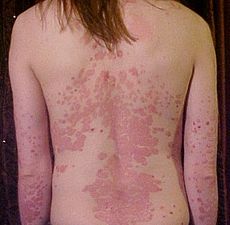Psoriasis is an autoimmune disease that affects the skin causing red and white scaly patches. It usually occurs on the elbows and knees, but can affect any part of the body. Those of you that suffer from this itchy condition know how frustrating it can be. Even though psoriasis is considered a chronic disease and can have a genetic component to it, there are many natural solutions and remedies that can help. Here are some natural skin care tips for Psoriasis from Advanced Natural Medicine Newsletter.
For the nearly six million people that suffer from psoriasis, it’s almost as if their skin is on speed. Normally, skin cells go from birth to death in about 28 days. But when you have psoriasis, your skin cells complete the whole process in a mere three to four days—almost nine times faster than usual. As a result, affected areas develop thick, red patches of skin covered with flaky, silvery scales. In severe cases, pus-filled blisters form on the palms of the hand or soles of the feet and the nails may become pitted and discolored. Itching and bleeding are common.
Episodes Triggered By Stress, Trauma, Dry Skin, and Bacterial Infection
Psoriasis episodes can be triggered by stress, trauma, dry skin and bacterial infection. An immune system abnormality likely plays a role. While it isn’t contagious, it does tend to run in families. Psoriasis can come and go—and just when you think you have it under control, there it is again! The longer you’ve had it, the longer it may take to clear up.
As common as this disease is, most patients aren’t very satisfied with the medical care they get from their doctors. One standard medical treatment is to soak in a warm bath for 10 to 15 minutes, then apply a topical ointment containing salicylic acid, steroids or coal-tar. Not only do these ointments fail to offer real relief to psoriasis patients, long-term use of steroids or coal tar can be harmful. But the good news is that natural methods can be successful.
External Treatments
For an external treatment, try a salve or cream that contains skin-healing herbs like calendula and St. John’s wort with tea tree or lavender essential oil. Apply the salve twice daily directly on the psoriasis. Witch hazel is another effective topical treatment that use widely used by doctors in Germany. Just dab it on affected areas with a clean cotton ball several times a day.
Once the skin inflammation begins to quiet down, try an ointment containing gotu kola. It’s an incredibly impressive herb for treating connective tissue damage. When compared to a synthetic anti-psoriatic treatment, scientists from London’s King’s College discovered that a topical gotu kola cream was just as effective at slowing the rampant production of skin cells. Another study of 49 psoriasis patients found that an ointment containing Oregon grape also helped put the brakes on overactive cell production. What’s more, earlier research shows that Oregon grape can boost the skin’s immune response and soothe moderate psoriasis by reducing inflammation and itching.
There area also lifestyle factors that can trigger psoriasis outbreaks and the most important part of dealing with this condition is to identify what they are. Only then you can try to avoid whatever triggers your outbreaks. Avoiding harsh soaps, shampoos and moisturizers full of chemicals and using only natural ingredients will help keep your skin moisturized. The best ingredients to use on your skin are olive oil, coconut oil, jojoba oil and aloe vera gel.
Always read the labels before buying any cosmetics or just make your own to prevent flareups. This way you can be sure you are only getting pure, natural ingredients and not cheap fillers, toxic chemicals and preservatives.
Some medication can also trigger the psoriasis outbreaks so consult your doctor if you suspect that this is causing your problems.
It is also known that weight has a lot to do with controlling flare ups, so eat healthy, exercise and keep your weight under control to prevent psoriasis breakouts. Most people notice an improvement in the disease when they stay away from certain foods like sugar, gluten, caffeine and most junk food. Also following a diet rich in Omega 3 fatty acids may help.
Getting moderate amounts of sunlight on your skin will not only stimulate Vitamin D production, but will also improve your condition. Just apply some coconut oil before going outside to keep the skin moisturized.
>Click here to visit the original source of this post





